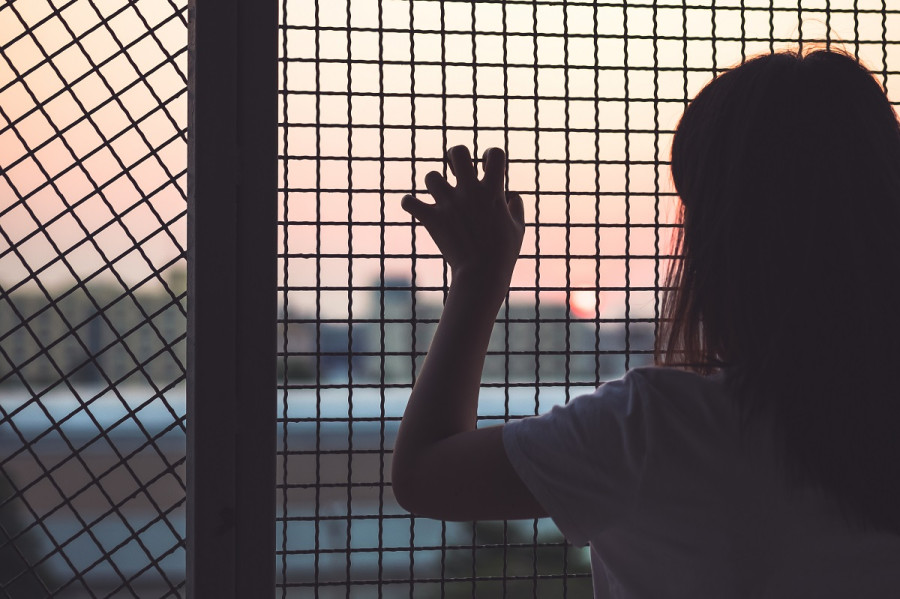National
Police looking for man who sold a 14-year-old girl in India
The girl was trafficked last year but had been too traumatised to speak up and a complaint with the police was only filed earlier this month
Shuvam Dhungana
It took 15-year-old S. nearly a year to speak up about her trauma.
Her story begins in July 2019. With only her mother and a mentally challenged older brother at home, she decided to come to Kathmandu at the age of 14 to find a simple job.
But in less than two months she found herself sold to a brothel in Delhi, India.
According to the police, S’s trouble started soon after she arrived in Kathmandu and visited her stepsister asking for help to find a job.
Her stepsister, who was living in Balaju, introduced her to a man, whom police identified as Arpan Tamang alias Raju Tamang.
Tamang befriended the teenager, promised to find her a job and even marry her. He took her to a guest house near the Gongabu bus park, raped her for a week and then handed her over to another man, S. told the police.
The second man took her in a taxi to the Nepal-India border, then to India and reportedly sold her to another man.
According to the statement S. has provided to the police, this Indian man again raped her saying that she now belonged to him and later sold her to a brothel in Delhi.
Inspector Kopila Kunwar, of the Anti-Human Trafficking Bureau of Nepal Police, said the minor only remembers the events but not the persons involved.
“We do not have much to go by because of which the investigation has become difficult,” she said. “A lot of time has elapsed since the case.”
Police have apprehended Tamang and are looking for the man who took her to India. S. can only identify him as Kiran.
“We are looking for the man who took the minor to India and sold her,” said Deputy Superintendent of Police, Dhundi Neupane, of the Anti-Human Trafficking Bureau.
Once in Delhi, the brothel owner continuously harassed S. to serve customers but she kept on refusing. She would make a scene and therefore did not serve any customer, according to her statement to the police.
She was locked up in a room for a week. But once she realised that the door was unlocked, she made her escape.
Once outside she fortunately came across a Nepali man who brought her to the Tikapur in Kanchanpur district and left her there since he did not want to get involved with the police.
The police in Tikapur found her but did not know what to do with her and handed her to the local branch office Sano Haat, a non-governmental organisation that runs a shelter and rehabilitates trafficked women, which has its head office in Kathmandu.
S. was soon brought to Kathmandu centre of Sano Haat and has been there since.
Only after much counselling did she finally open up to what had happened to her. The organisation at first tried to find the culprit and hand him over to the police but when it couldn’t, it took the help of the police.
A complaint was filed on August 13 and four days later, 22-year-old Tamang was arrested.
With the lockdown in place, crime has generally gone down, according to police records and so has cases of trafficking.
According to the data provided by the Anti-Human Trafficking Bureau of Nepal Police, it has rescued 28 people, all women from India as well as Nepal-India border and arrested 20 people for their alleged involvement in trafficking, during the five months period of lockdown which started on March 24.
In the last five years, a total of 1,138 cases were filed across the country while 1,507 people were arrested on the human trafficking charge.
In 2015/16, a total of 212 cases were filed while 269 were arrested, in 2016/17 the number of cases rose to 227 and 259 were arrested.
Similarly, in the fiscal year 2017/18, 305 cases were registered across the country and 448 were arrested. It however declined to 285 in the year 2018/19 during which 333 were arrested.
In the last fiscal year 2019/20, 136 cases were filed across the country and 198 were arrested.
According to a 2019 report by the National Human Rights Commission (NHRC), nearly 1.5 million Nepalis are at risk of various forms of human trafficking. The rights watchdog report said that aspiring migrant workers, Nepalis working abroad, people in the adult entertainment sector, girls and women from rural areas, missing persons and child labourers are among the groups most vulnerable to trafficking.
As per the report’s estimate, nearly 35,000 Nepali citizens—15,000 men, 15,000 women and 5,000 children—were trafficked in 2018-19. Foreign employment and child labour made up nearly 70 percent of the total trafficked population, followed by those from the entertainment sector and those reported missing.




 18.12°C Kathmandu
18.12°C Kathmandu














